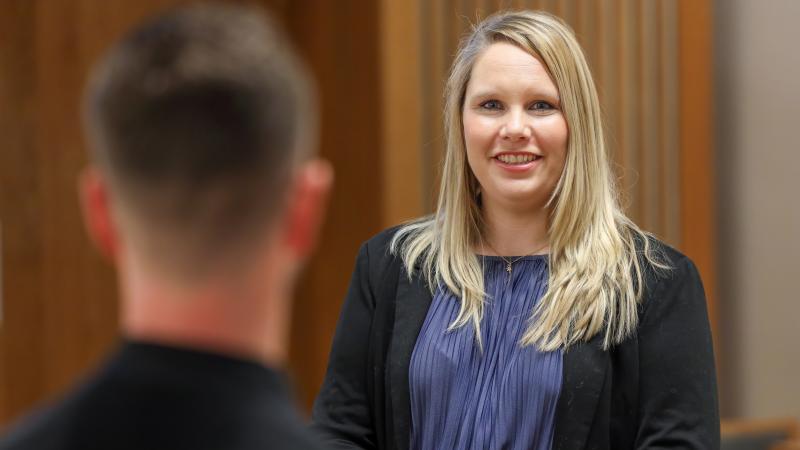The story of Deborah, senior employee DJO
‘Our team is a necessary link that completes the chain’ Deborah has noticed that a lot of people who once left the Immigration and Naturalisation Service (…

My work is intensive, impressive and has an impact.
A legal representative for the IND only comes into action if someone’s application was rejected and if they appeal against this. The case will then go to the legal representative. They, in turn, delve into the file and write a defence that goes to the hearing.
As a legal representative, you are confronted with quite a range of cases. For example, you may have to deal with admission cases, but also aliens detention cases or cases on duty. Does this make your head spin? Understandable. Marjon is happy to show you around in this legal landscape. ‘Admission cases include both asylum and regular applications processed by the IND. For example family reunification. Aliens detention cases involve cases of people who await removal from the Netherlands and whom we are afraid they will abscond. For this reason, they are temporarily deprived of their liberty. And cases on duty are the really urgent cases, where someone will be removed from reception or the country within 48 hours. Then you often have only one hour to formulate a position. These are cases where something new has suddenly emerged that can change the situation. For example if someone gives birth to a baby in the Netherlands, is unable to leave for medical reasons, or obtains new evidence.’
What happens concretely in a day for Marjon? ‘In the first place, this depends on the type of case I’m working on. Admission cases are different from aliens detention cases or duty cases. But at the core, it means that I get to the bottom of a file from the stock and analyse it. Then, I decide whether we can take the case to court or whether additional information is needed. What happens when the case goes to court? Then I write a defence. It contains arguments and evidence which I use to justify the decision by the IND. In court, the legal representative puts forward a plea. You answer the judge’s questions or you provide an additional explanation to the written defence. I usually do not plead in cases for which I wrote a defence; colleagues take turns in this.’
When Marjon is at court, she usually has between three and nine hearings per day. This depends on the type of case. ‘If I have a day of admission cases, I have up to six of them. For aliens detention cases, there may be eight or nine. This is because these are shorter proceedings. Of course you want to deprive someone of their liberty for as short a time as possible, so it is important that decisions are taken quickly in this type of cases. In cases on duty there is often no hearing at all. The judge then issues a ruling based on the written defence.’
For Marjon, each week can be different. ‘And that’s what makes the job fun for me. You get to deal with all kinds of subjects in admission cases, allowing me to delve into new themes all the time. You can prepare well and are unlikely to face surprises in court. By contrast, on-duty and aliens detention cases are very ad hoc. You don’t really know what you’ll be facing. In aliens detention cases you only find out at the hearing why the foreign national disagrees with the decision. And in on-duty cases something new suddenly emerges, which you can’t anticipate either. The challenge is then to change gears quickly and stand your ground.’
Aliens law is very much alive and this appealed to Marjon. ‘There are continuous developments both nationally and internationally. In addition, it touches closely upon politics and this arena keeps me captivated. At the same time, it is not always easy to be on the side of the “no-sayer”. After all, you have to deal with human lives. At a hearing, emotions often run free. I see what it does to human lives, how much sadness and anger people have. This also touches me. And sometimes, I must plead in cases where I would have liked to act differently as a person, but am tied to legislation. Then I say, for example, “the Minister for migration is of the opinion,” so that I can distance myself somewhat as an individual.’
Despite the difficult times, Marjon is completely at the right place. ‘As a legal representative, I am a link in the process and my work has social importance. In principle, I defend the decision by the IND on an application. But before I get to the bottom of a new file to write a defence, I first assess our due care in decisions one more time. It sometimes happens that I withdraw the decision of a decision staff member. The application must then be reassessed.’
Her work is intensive, impressive, and has an impact. Fortunately, she doesn’t arrive home depleted by a day of work. ‘Not all cases are very harrowing. There are plenty of cases where it is very clear that the applicant has no right of residence. I then feel like I made a real contribution. This variation gives me the right balance. I’m not going to get bored of this any time soon.’
‘Our team is a necessary link that completes the chain’ Deborah has noticed that a lot of people who once left the Immigration and Naturalisation Service (…

‘My contact with the candidates is personal and unique’ Has a vacancy remained unfilled for months? Or is a job difficult to carry out? Then Fatih comes…
‘Privacy is a right, not a privilege' Nowadays, personal data can be easily misused. With merely a profile picture from social media,…